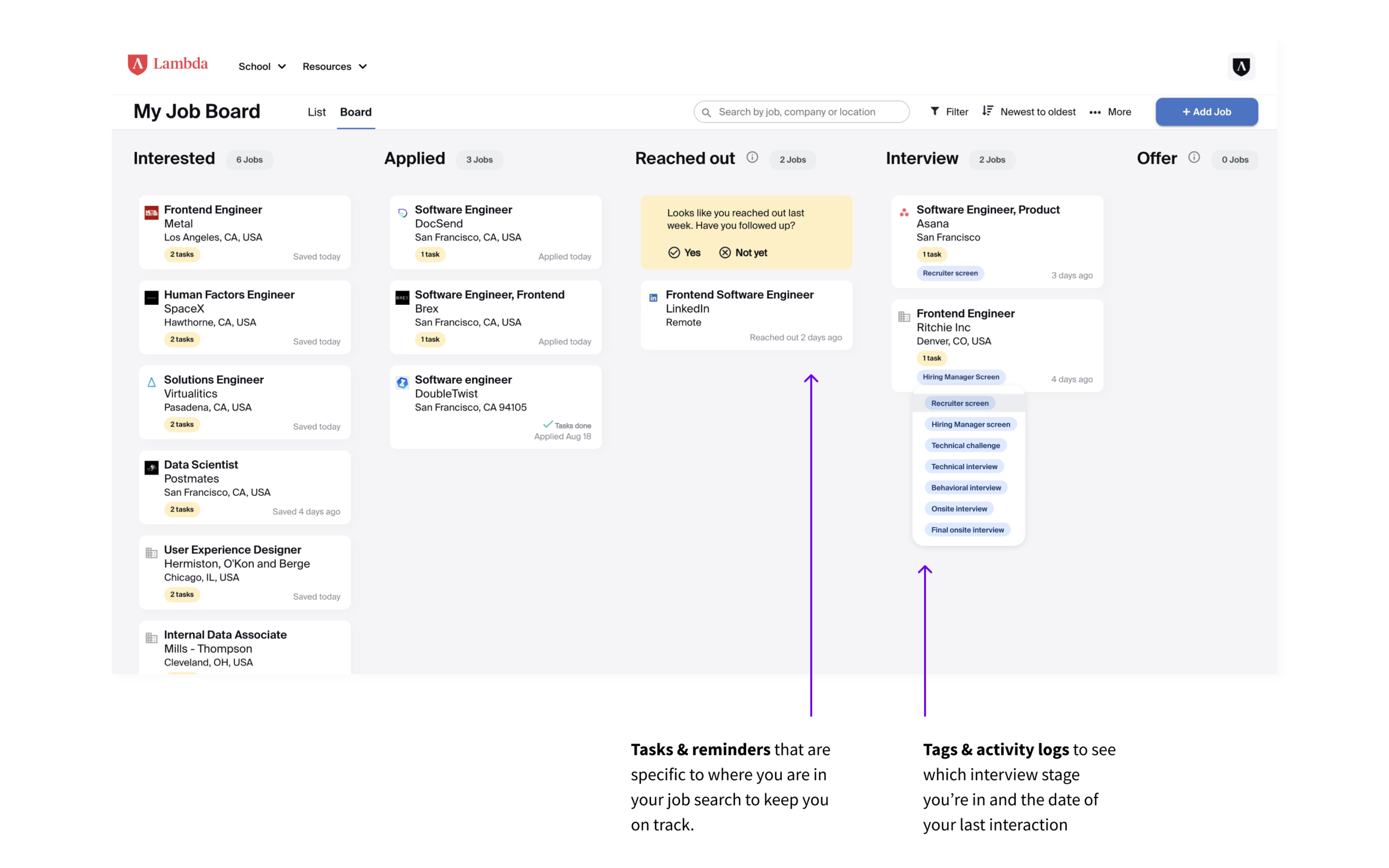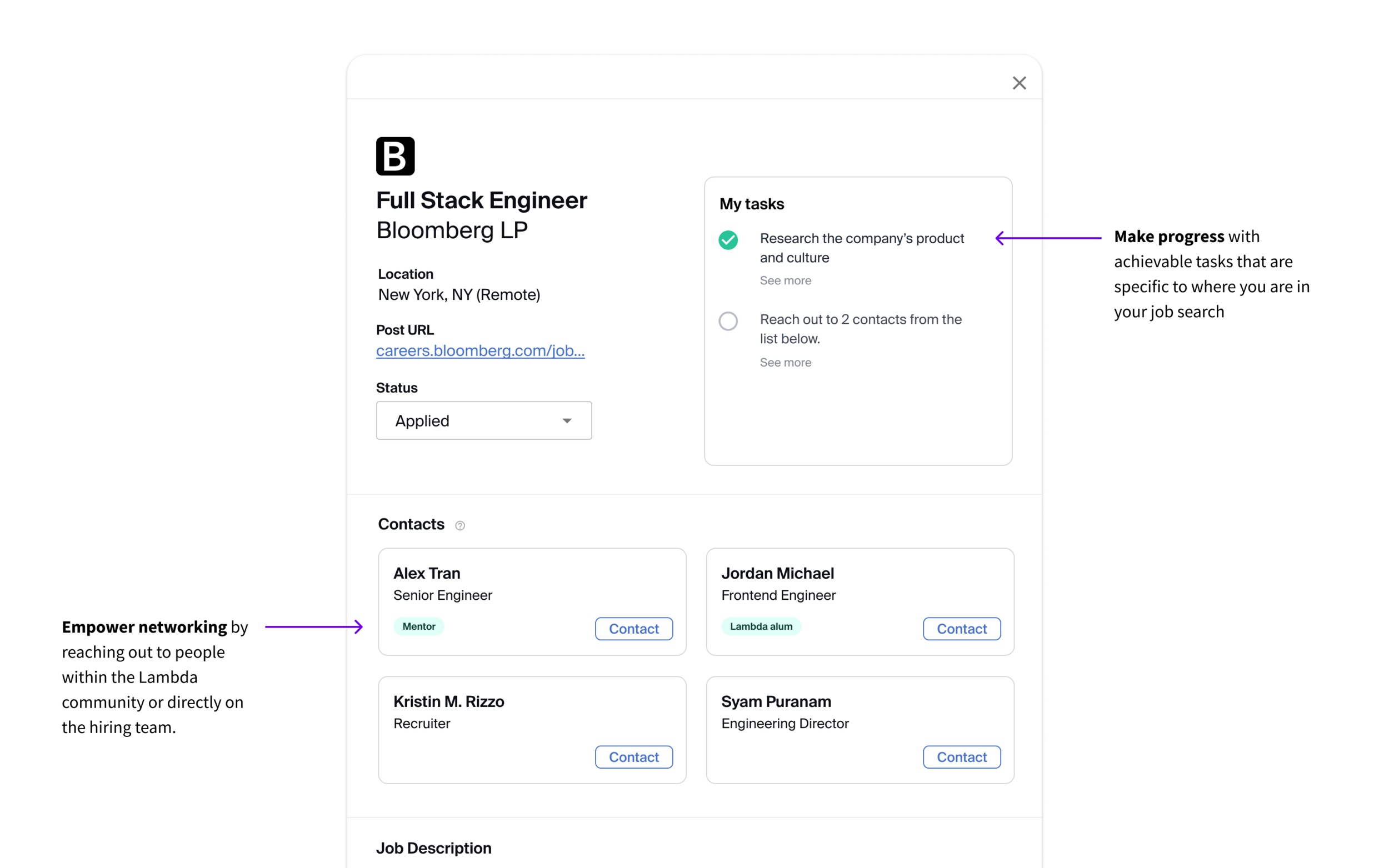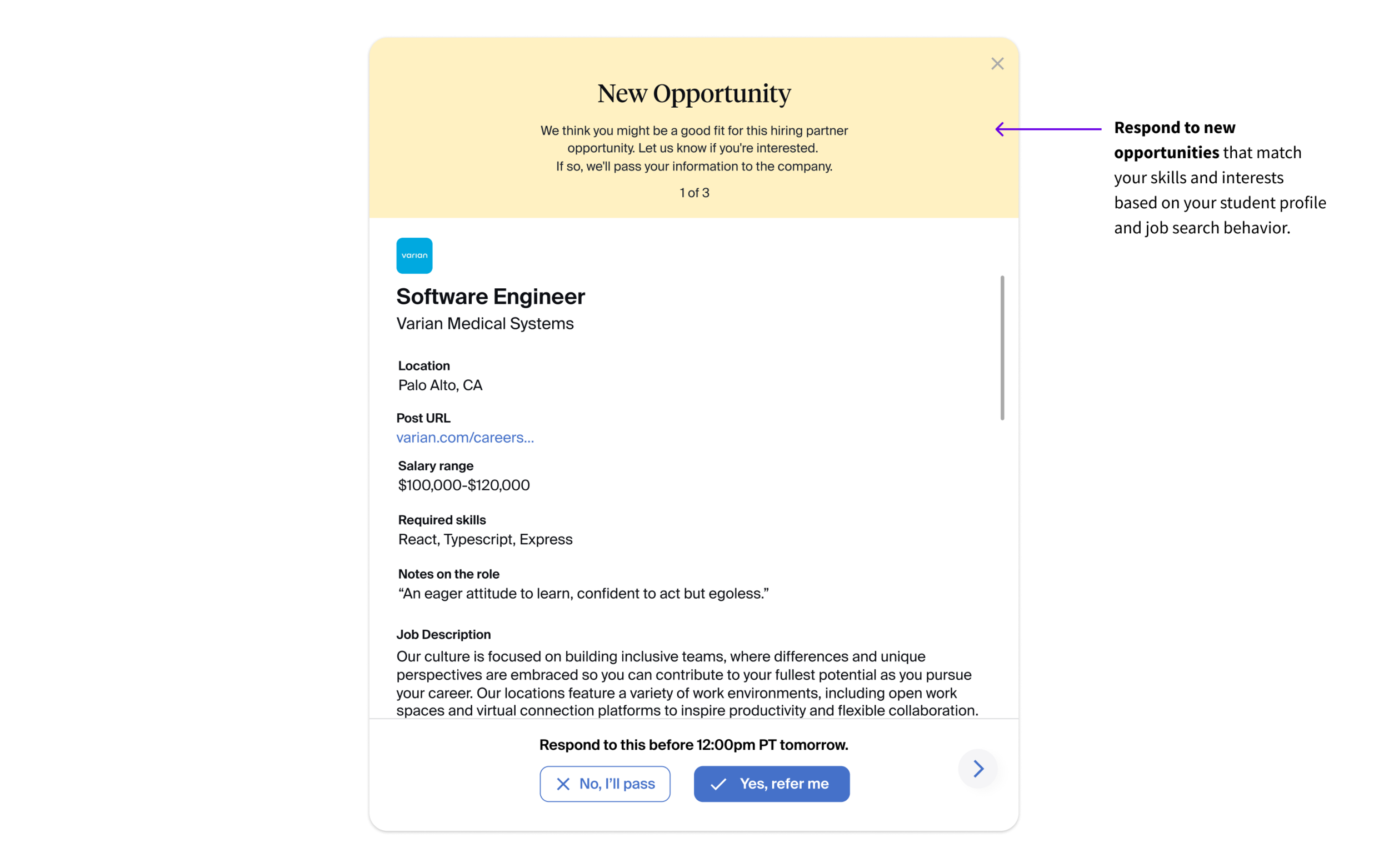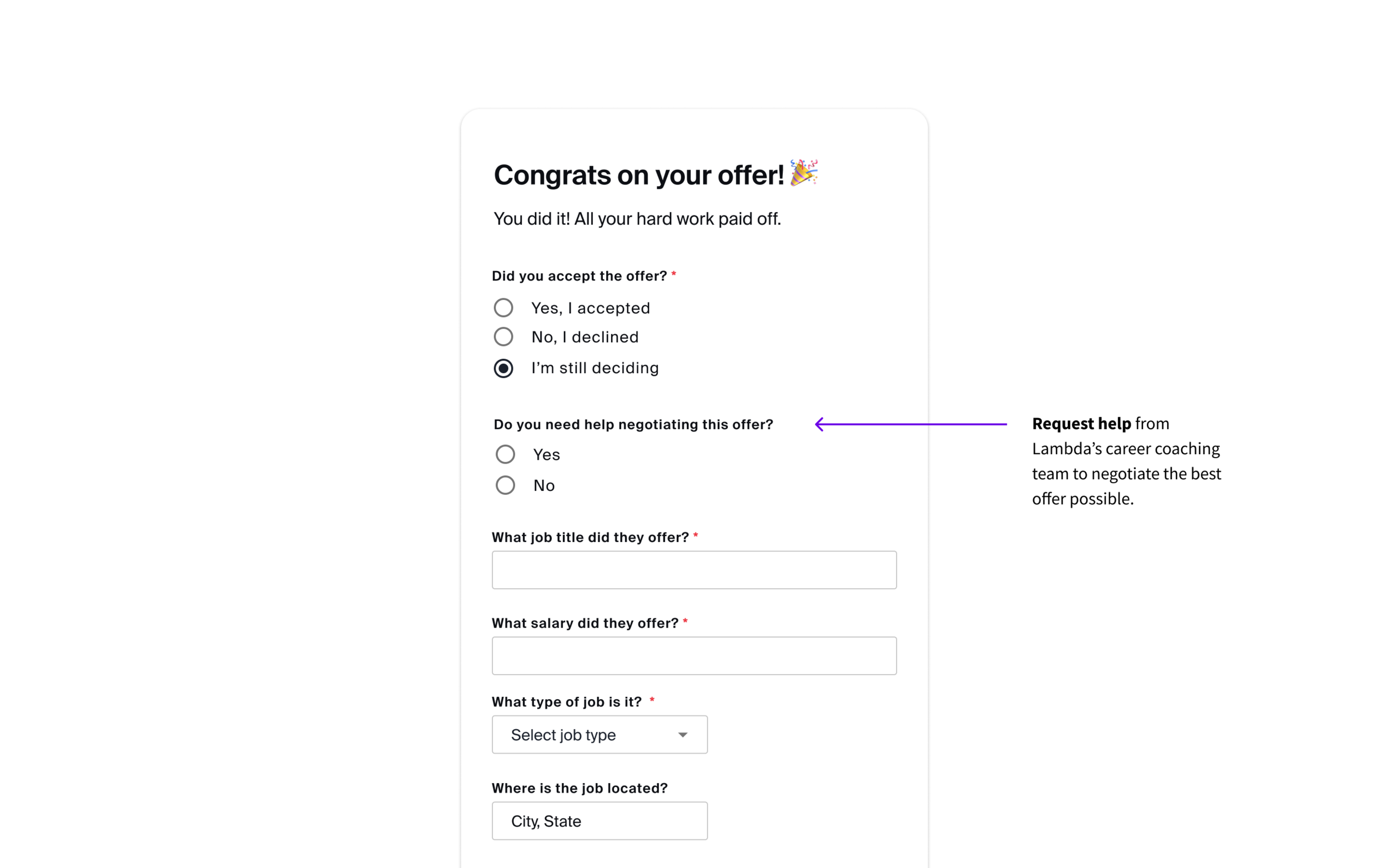
Lambda School Job Tracker
A job tracker Chrome extension and interactive job board to help candidates track job opportunities and manage their job search process from beginning to end.

OVERVIEW
Lambda School is an online immersive school that trains people to become software engineers and data scientists. At the end of their program, they are looking for work and need help landing their first tech job.
DELIVERABLES
We launched two products to help students prepare for the job hunt:
Job Tracker: a Google Chrome extension form for students to save job opportunities across the web
Job Board: a project management tool that enables students to keep track of job opportunities, network, and prepare for interviews
ROLE
Lead Product Designer & User Researcher (with 1 Product Manager and 4 Engineers)
impact
Over 2,500 job postings added in first month
4x increase in user engagement
62% of data insights on student outcomes from product usage (more than any other channel)

Challenge for students
The job search process can be overwhelming for many. It’s especially intimidating for Lambda students who may have less prior work experience and are seeking a job in the tech industry for the first time.
Business opportunity
Lambda School has little visibility into a student’s job search process. By creating a job-tracking product, the operations team can see jobs students apply to, help them find opportunities, prepare for interviews, and assist with offer negotiations.
Final Products
Job Tracker & job board tool
Our goal is to empower students to manage their job search and feel better prepared as candidates, while also providing the operations team with more data and tools to help. We launched the Job Tracker Chrome extension and Job Board to all 3,000+ students at Lambda School. See full demo of the product below.
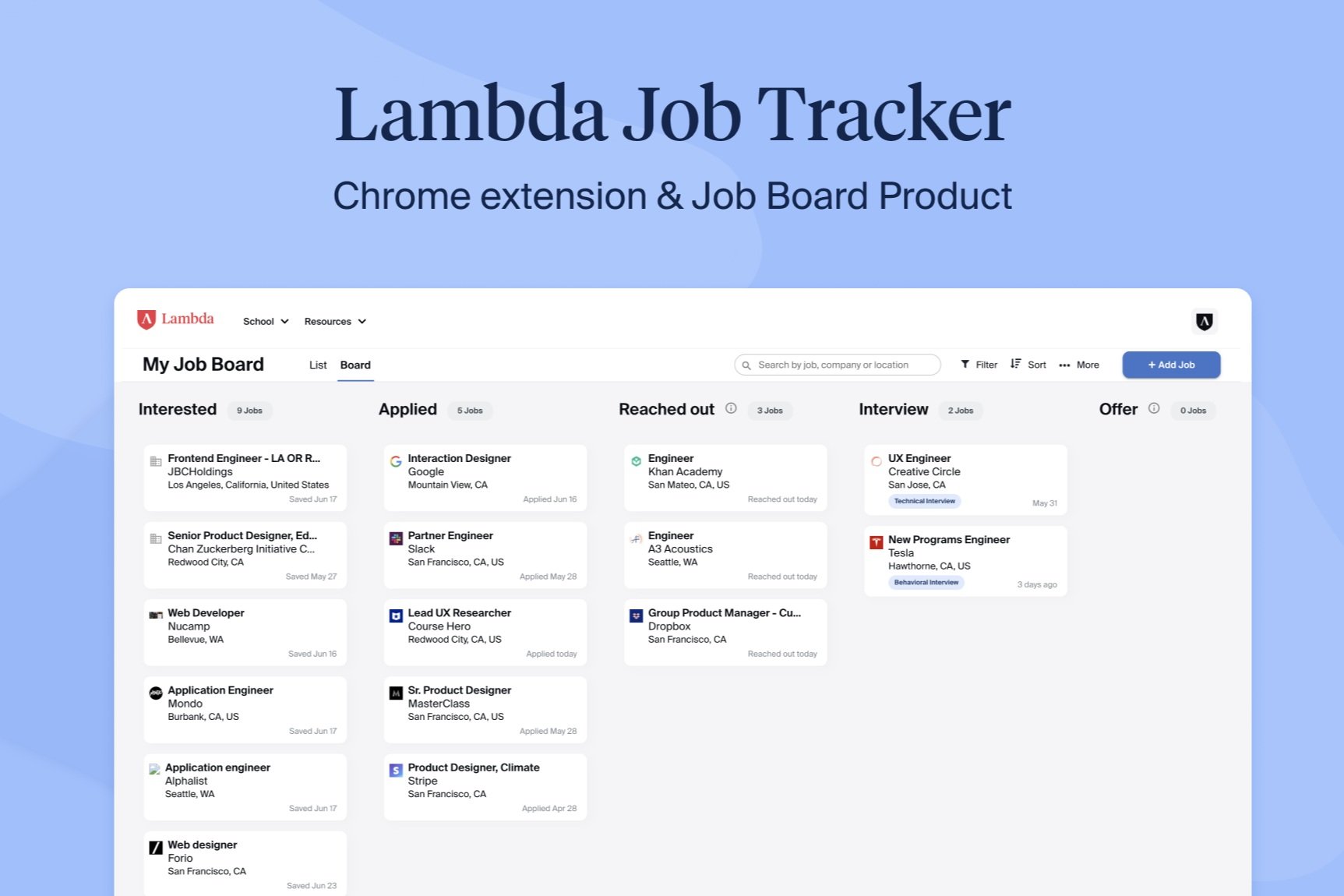
Press play to watch product demo with sound on
Key features emerged from ongoing user testing:
job board Tasks, Network connections, and new opportunities
Tasks and reminders help students take the next step and track their activity
Network connections surfaced within the job cards enable easy outreach to the hiring team
New opportunities encourage students to apply to jobs that match their preferences and skill level
Negotiation help enable students to enlist help from Career Coaches to negotiate the best offer
Design Research
user Interviews uncovered four types of job seekers
During discovery research, I interviewed 18 students and 6 stakeholders (career coaches and job sourcers on staff). These interviews revealed major insights into the mindsets and behaviors of job seekers. Students on the job hunt fall into four categories: Novices, Delayers, Net Casters, and Catalogers.

Novices are new to platforms like LinkedIn, Indeed, and Glassdoor. Some have limited work experience and are applying to jobs for the first time. Some are career shifters and haven’t created a resume in many years.

Delayers find it hard getting motivated to complete their resume/portfolio because they have so many other things to do. They feel burnt out juggling all their school and personal commitments. Some don’t feel confident enough to apply to jobs because their portfolio isn’t done.

Net Casters apply for every job opportunity at every experience level and location (aka “cast a wide net”). They then wait for a response and often don’t hear back. Some don’t keep track of where they applied and don’t know who to follow up with or when to follow up.

Catalogers meticulously track all details of their job applications and use tools like Excel spreadsheets, Trello, Huntr, Reminders/Notes app on their phones, etc. Once they find a process they like, they stick to it and don’t want to switch unless there’s real value added.
The level of confidence and motivation during the job search journey was typically the highest in the first two months and sharply declined around months five and six.
Experience Principles
To address the core needs of each of these groups, I created four design principles to guide our product design. To be useful for job seekers, the product had to be:
clear
INtuitive
Convenient
encouraging
Development Process
building, testing, & learning as an agile team
Our product team followed an agile development process to build the product over several sprint cycles. As the sole Product Designer, I conducted all the discovery research, user interviews, prototyping, high-fidelity designs, and user testing to deliver this project from beginning to end.
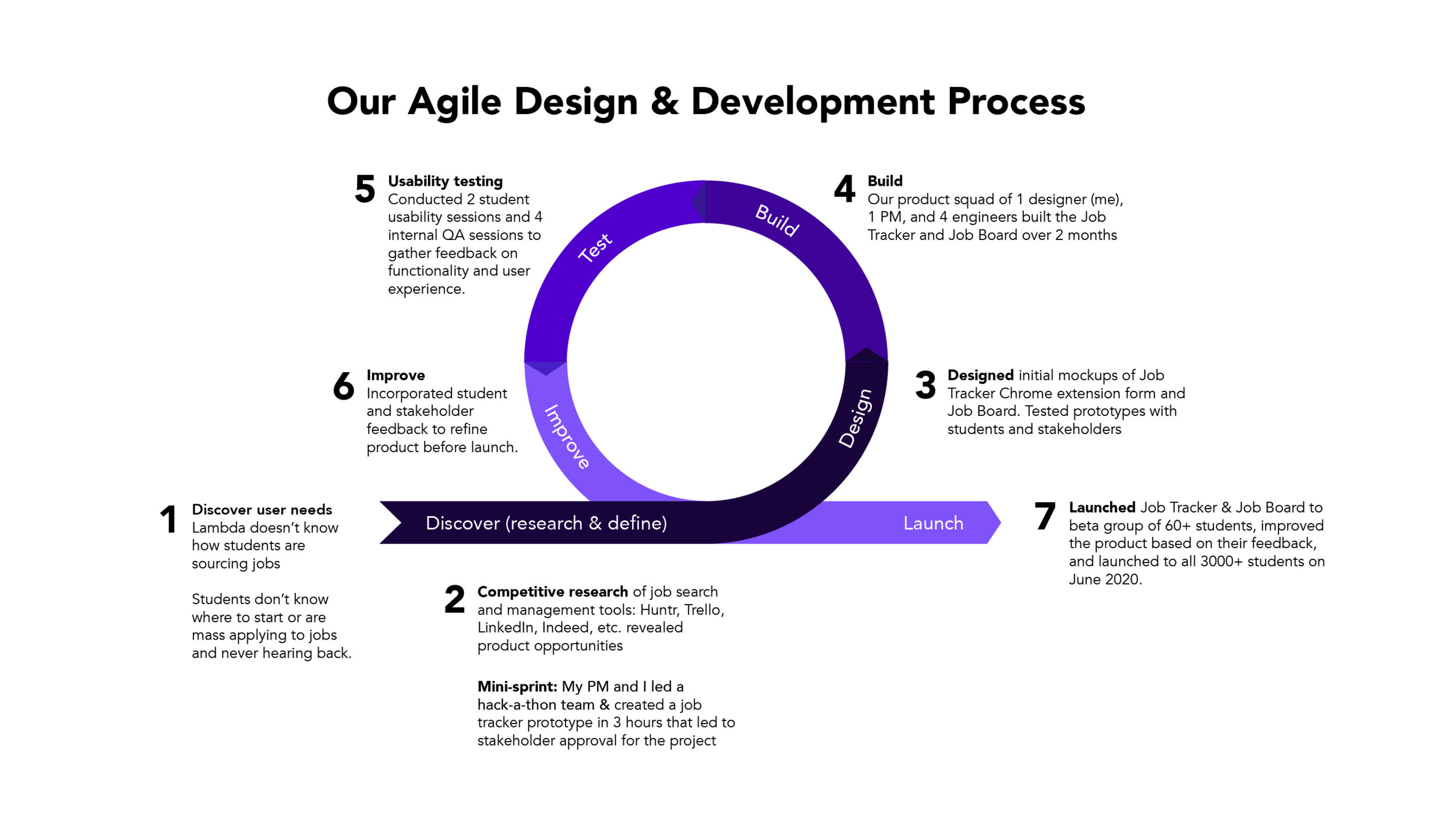
auto-filling Job postings to save even more time
Using auto-fill to translate job postings on LinkedIn and Indeed into the Job Tracker makes it more convenient to save multiple job opportunities. Removing friction of manually entering text is a huge time saver.
Capturing Offer details: a big win for the business
Enabling students to report their job offer details unlocks the ability for Lambda’s career coaching teams to help students negotiate and secure the best job offers possible.
It also improves overall data reporting. Since Lambda’s business is based on students paying their tuition through an income share agreement, improved data tracking achieves a major business goal.
These were just a few of several features that we built into the final product. You can view the full product demo here.
Impact
increased student adoption and engagement
“I liked the simplicity of Job Board. One purpose, very straightforward. I didn’t have to keep track of everything myself.”
- J.M., Lambda student
“I just want to say I really love the Job Board. I've used [others] a long time ago but the Board is way better: more intuitive and user-friendly.”
- Student Success Coordinator (Lambda staff who works directly with students on school and career progress)
better data insights and student outcomes
With the new job offer reporting feature, students self-reported 30 job offers within a week, resulting in faster data and less effort spent by staff in gathering individual student data.
Over 2,500 job postings (average 580 posts per week) were added to the Job Board in the first month since launch.
Learnings
Becoming a product marketer + project manager for launch 🚀
Right before launch, we lost half our team due to COVID-19 layoffs and personal leaves. As a result, I took on the roles of product marketing and project manager to get everything launch ready.
I stepped in to create the user guide and demo videos, coordinated QA sessions, and aligned with internal teams across marketing, student operations, and legal to prep our communications plan. It was a rewarding experience to be able to tap into my background in marketing and business operations to get the product across the finish line.
Image credit: Unsplash, Open Peeps. Product images are my own.

